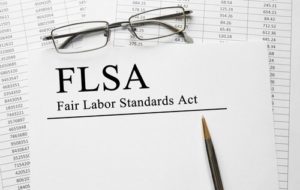Long Island FLSA Violations Lawyer
Law Office of Cohen & Jaffe, LLP.
Are you a victim of a Fair Labor Standards Act (FLSA) violation?
The FLSA protects employees in matters regarding wage and hour claims, minimum wages, overtime, provisions for breaks, and the maximum number of hours an employee can be expected to work.
If your employer has violated your rights under the FLSA, you may be entitled to seek justice and compensation with the help of the Long Island employment law attorneys at Law Office of Cohen & Jaffe, LLP. If your employer has unfairly withheld wages, not paid you proper wages or has illegal deductions taken from your pay, your employer may be in violation of the FLSA. Employers are also strictly prohibited against accepting illegal kickbacks or appropriating tips.
New York state law has changed regarding minimum wages. An increase will go into effect on Dec. 31, 2015, when the minimum wage will be $9 per hour in New York. Are you being paid less than the minimum wage? You may have a right to take action against your employer to collect the money owed you. It is worthwhile to discuss this situation with a lawyer to increase your chances of getting paid what you are due. Your immigration status is not a concern in these cases.
It is important for you to discuss your situation with a lawyer that has your best interests at heart, and will take the correct action to seek justice. To find out more about your rights, call us now or fill out our online contact form for a free consultation and claim evaluation.

Types of FLSA Violations
There are a range of potential FLSA violations. An employee may have been promised certain vacation days with pay, paid sick leave, reimbursement of expenses or other similar types of wage supplements. If the employer then fails to uphold the agreement, legal action may be taken against that employer.
Any time an employer changes the rules – such as altering policies regarding sick leave, personal leaves of absence, holiday days or hours of work – a strict procedure must be followed for the change to be legal.
The state Department of Labor now has the authority to administer the law regarding agreed-upon fringe benefits that have not been paid, or changes that were made to policy and not correctly posted.
Failure to Pay Overtime Wages
If your employer expects you to perform your work duties past standard working hours and on weekends, you could find yourself in a difficult position, with no time left to tend to your personal and family needs. Those who are on salary, rather than an hourly wage, often become the victim of this type of activity.
The FLSA regulates overtime, but does not impose any limits on potential overtime. The law does require that employees working for an hourly wage are paid time and a half for hours beyond 40 hours per week.
Mandatory overtime puts extreme stress on workers, many of whom have little time left to devote to their families or other activities. There are employers that believe the only way to determine the commitment and drive of an employee is to expect the majority of their time and attention to be focused on the company and its success.
If you work more than 40 hours per week and are not paid overtime, it is important that you get your case evaluated by a lawyer who is skilled in state and federal labor laws and who has a track record of success in seeking justice for employees.
Some people work in positions that their employers claim are exempt from overtime pay, such as salespeople, supervisors, executives and other professional employees. In fact, a full evaluation of your situation may reveal that your job was “non-exempt” and you have been cheated out of overtime pay you should been paid, or that your designation as a contractor did not meet the legal definition. If so, you may have the right to file a claim to seek all of your back overtime pay.
Our firm is ready to review the facts in your situation and advise you about whether you may have legal grounds to file a claim to recover overtime pay and other damages.
Independent Contractor or Employee?
Many employers identify certain employees as independent contractors when in fact, under federal law, they are not. Workers who are economically dependent on their employer, no matter what level of skill, are employees – not contractors.
Independent contractors are people in business for themselves. Many workers suffer hardships merely because they are wrongly designated as an independent contractor rather than as an employee, leaving them without access to benefits such as overtime pay.
The FLSA evaluates whether a worker is in fact, an employee, not a contractor by reviewing the following facts:
- The extent to which the work is an integral part of the business. This looks at whether any of the worker’s skills in management will affect the opportunity for profit or loss. Any worker who exercises managerial skills is likely an employee, not a contractor.
- The investment in facilities and equipment by both the worker and the employer. To be correctly designated as an independent contractor, the worker should have some investment in the tools of his or her trade. If all investments in the tools and equipment come from the employer, it is often an indication that the worker should be correctly designated as an employee.
- The skills and initiative of the worker. An independent contractor must have the ability to exercise his or her own business judgment and operate as an independent business.
- Permanency of the position. A long-term relationship with an employer suggests that the worker should be designated as an employee, rather than a contractor, but this point requires a full analysis of the situation as it relates to the industry.
- The degree of control exercised by the employer. Independent contractors are those who work free from the control of the employer or the employer’s clients. Just working offsite is not adequate to determine whether a worker is a contractor or an employee, particularly when the employer exercises substantial levels of control over the working relationship.
FLSA Violation? Contact an Employment Law Attorney at Law Office of Cohen & Jaffe, LLP
If you believe your employer has violated the FLSA in your employment on Long Island or nearby areas including Nassau County, Suffolk County and Queens, Law Office of Cohen & Jaffe, LLP is here to help you. You may be entitled to back pay or other benefits. Our attorneys can see to it that your rights are protected and that you get the money you deserve.
Call us or fill out our online contact form to talk to an employment law attorney with Law Office of Cohen & Jaffe, LLP. We will respond to you immediately and aggressively pursue justice for you.
Sources:
- U.S. Department of Labor – Fact Sheet #13: Am I an Employee?: Employment Relationship Under the Fair Labor Standards Act (FLSA)
- N.Y. Department of Labor – Employers Cannot Retaliate Against You For Reporting Labor Law Violations
- U.S. Department of Labor – New York Minimum Wage Rates
- Economic Policy Institute – Time After Time: Mandatory Overtime in the U.S. Economy
- N.Y. Department of Labor – Wage and Hour Law









